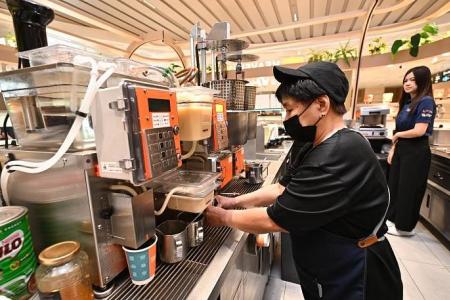12,000 lower-wage food service workers to get pay hikes from March 1
Lower-wage food service workers, such as waiters and cooks, can expect annual pay hikes for the next three years as the Progressive Wage Model (PWM) kicks in for the sector.
Under the model, lower-wage food service workers who are Singaporeans and permanent residents will benefit from a three-year schedule of sustained baseline wage increases of up to 19 per cent from 2023 to 2025.
From March 1, about 12,000 full-time food service workers will see their wages rise to match at least the entry-level PWM wage level of $1,750. This baseline wage will eventually increase to $2,080 in 2025, or an increase of 19 per cent over the three-year period.
There are about 26,000 full-time food service workers in Singapore. Of these, 17,000 are considered lower-wage workers, and about 12,000 of this group of lower-wage workers are currently earning below the entry-level PWM wage level.
The model, recommended by the Tripartite Cluster for Food Services (TCF) and accepted by the Government, also comprises a clear career progression pathway for workers and the training they require. The TCF comprises tripartite representatives from government agencies, union, associations and firms from the food service industry.
As a result, some 41,000 resident full-time and part-time food service workers are set to benefit from the new recommendations as a whole.
Employers will have a transitional period of six months – from March to August – to adjust and comply with the new requirements. Tripartite partners will also be educating employers.
After this period, employers who do not comply with the PWM requirements may have their work pass privileges suspended, MOM said. This generally means the firm may not be able to apply for new work passes or renew existing ones.
The PWM was introduced in Singapore in 2012, helping to lift the wages of workers in six different industries such as those in the cleaning, security and landscaping sectors. The food service industry is the seventh sector that the model has been introduced to.
The TCF has also proposed a career ladder for food service workers to help them earn higher wages, pick up skills and gain the ability to take on more job responsibilities.
This includes differentiated tracks for quick-service establishments and full-service establishments, caterers, and central kitchens.
Quick-service establishments refer to fast food outlets, food kiosks, food courts and other eating houses where customers self-collect their orders from service counters.
The mandatory PWM wage requirements will cover job roles in this career ladder, except for those in the highest rung, where wages will be determined by market forces, MOM said.
To raise productivity, the TCF has recommended that each food service worker complete at least two Workforce Skills Qualifications (WSQ) training modules relevant to their job role. Employers will have one year from the implementation date of March 1 to ensure their workers meet the training requirements, MOM said.
Get The New Paper on your phone with the free TNP app. Download from the Apple App Store or Google Play Store now



